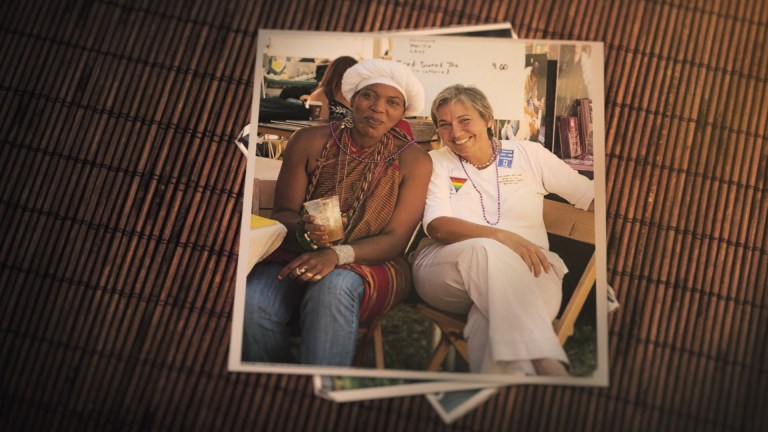Call Me Miss Cleo Unpacks a ‘90s TV Icon
Predictions are fulfilled as Call Me Miss Cleo finds questionable answers and a fallen star.

An overwhelmingly vast number of psychic claims should be taken with a healthy dose of salt, and Call Me Miss Cleo aims to be sodium-free. HBO Max’s original documentary does, however, throw a little bit of corn syrup into the mix. It promises viewers an in-depth study on a complicated con game, Psychic Readers Network (PRN), a call-in service which took in billions of dollars from the desperately lonely, and pours out a VH1 Behind the Music-style tale of a fallen celebrity who couldn’t see her fate in the stars.
Call Me Miss Cleo is co-directed by Jennifer Brea and Celia Aniskovich, and they come at it with great empathy, which undercuts the accusations against the prime suspect, and makes the prosecuting investigators look like true believers. Neither is the case, but the ambiguity is only skimmed in the dark pond of corporate malfeasance and community standards. The late middle section, which breaks down the fraud allegations against the Psychic Readers Network, feels more like a game being played by smirking attorneys who love talking with tongues in their cheeks because it makes speaking out the side of their mouths that much easier.
The on-call readers, tasked with keeping callers on the line for more $4.99-per-minute deep dives, exhibit more empathy towards the fleeced than the investigators looking to shut down the communal confessional. While there is enough insinuation to go around, the agents of justice seem to thrive on keeping the myths alive by debunking them. Gerald Wald, a receiver for the Federal Trade Commission, mentions billions of dollars in fraudulent billing, but forensic clerical workers get far more glee when finding Miss Cleo’s signature on the contract. This leads this reviewer to wonder: If Miss Cleo is just a public face of a company, is a one-word signature, “Cleo,” even legal?
The character of Miss Cleo receives deeper context, but the real-life Youree Dell Harris sheds depth with every detail that comes out. She was more than the spokesperson for the Psychic Readers Network, she was the unwitting cult leader cut out of the big percentage, and left a mockery and prisoner of the shaman character she created. The documentary gets into Harris’ time as a playwright-performer in Seattle’s Langston Hughes Performing Arts Institute. Her last play, Supper Club Cafe, in 1997, failed, but she created a mystique of herself as she tried to put mystery on the stage. The director saw potential, there was a true artistry there.
The art of a con is as complicated and versatile as the art of acting, and both are as studied. Creating a character who captures the imagination is an art, and while the artistic community may look back in dismay and betrayal, they also never lose a touch of their appreciation of the craft. A character they saw being workshopped on a theater stage became a late-night TV cult hit in an infomercial about the most popular telephone hotline in America. If only they’d auditioned.
Harris’ self-proclaimed voodoo priestess doesn’t merely host the spots, she invites people in, so deeply there is a tinge of envy in the performers’ recollections, with naked appreciation. Miss Cleo’s catchphrases – “The cards never lie” and “Call me now” – marked her as the after-hours Fonzie. Between 1997 and 2003, you couldn’t go to sleep without seeing Miss Cleo on a TV screen, and the Seattle theater troupers still linger before changing the channel.
Miss Cleo comes across as complicated, enigmatic, and reluctantly iconic. We don’t know whether she could commune with the dead, or see the future, but she could read people. She had the power of collective stereotype behind her, providing a universal comfort, and more than a few giggles. Whole courses can be taught on the inconsistencies of her Jamaican-accent, but only a few fragments of paper cover her background.
Stories of Jamaican foster parents are weighed against a Los Angeles birth certificate, some indefinite all-girls boarding school scribblings. Youree Harris apparently made up her past because she was creating a future only she could see. PRN owners Steven Feder and Peter Stolz, while hit for some restitution and damages, do the real magic. They make everything disappear, and no one admits wrong-doing.
Aniskovich and Brea forge Miss Cleo into a tool. Call Me Miss Cleo buys the ambition, but tempers it with altruism, and a self-preservation story. Harris is a casualty of exploitation, but as an enabler who didn’t get paid enough. Most of the latter interviews are done with friends of the former personality, who went into seclusion before coming out in local LGBTQ advocacy events, during a period of severely heated civil liberty political battles. The highlight of the documentary is an interview with Harris from 2016, where she calmly explains the excitement she created.
Harris died on July 26, 2016 at age 53 after battling colorectal cancer, but Miss Cleo lives on. During interviews, actor Debra Wilson, who spoofed Miss Cleo in a series of skits on Mad TV, now channels the character’s warm and loving charisma. Raven-Symoné sees the psychic phenomena as a soul-blazing fellow traveler, with enough street cred for the former Disney Channel Absolutely Psychic star to believe. Call Me Miss Cleo captures the call-in paranoia of the original truth seekers: you might want to take another look at the bill.
Call Me Miss Cleo is streaming on HBO Max now.
